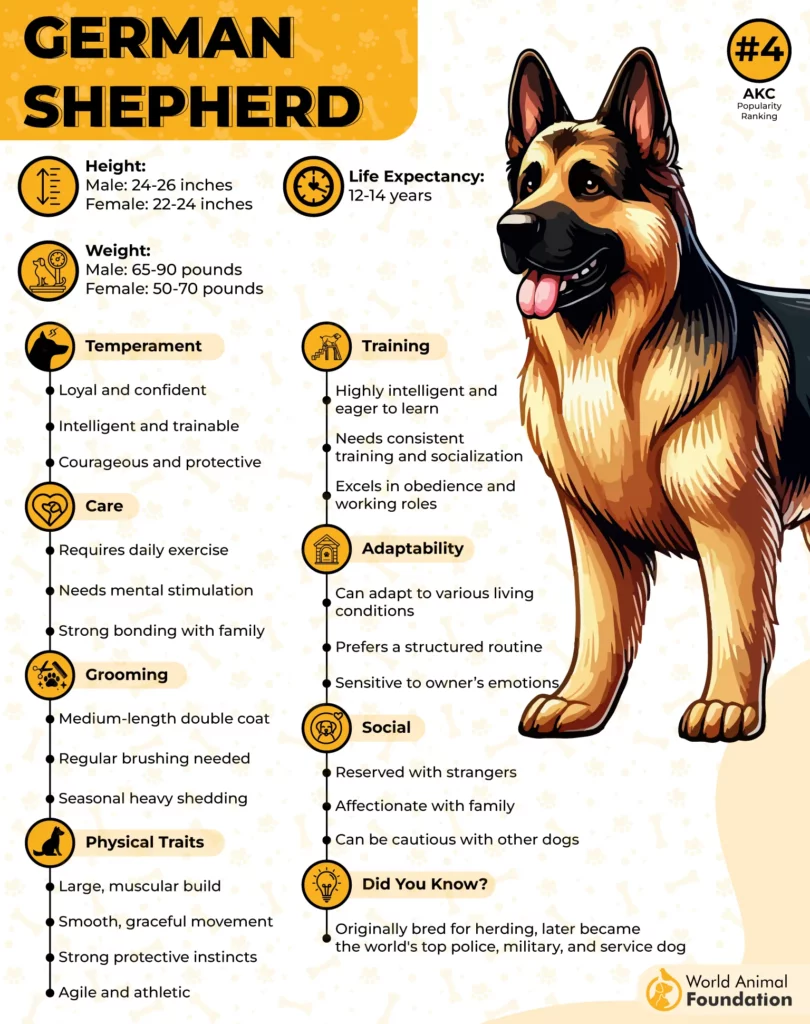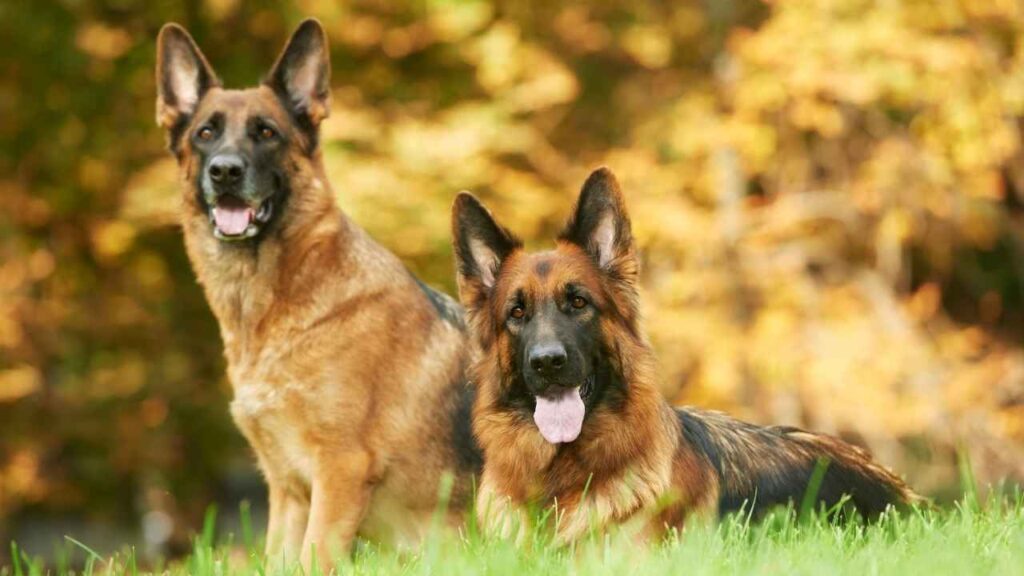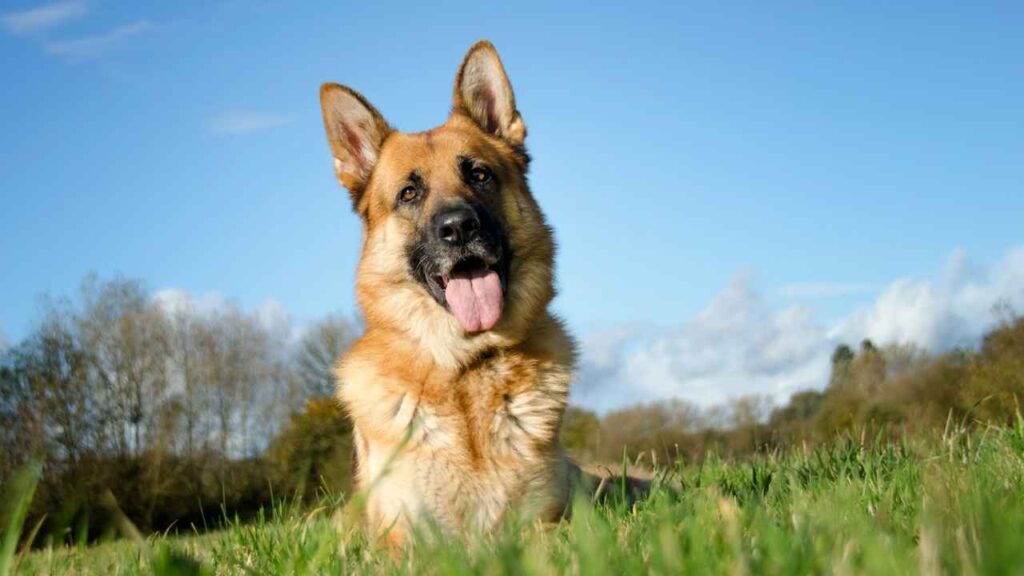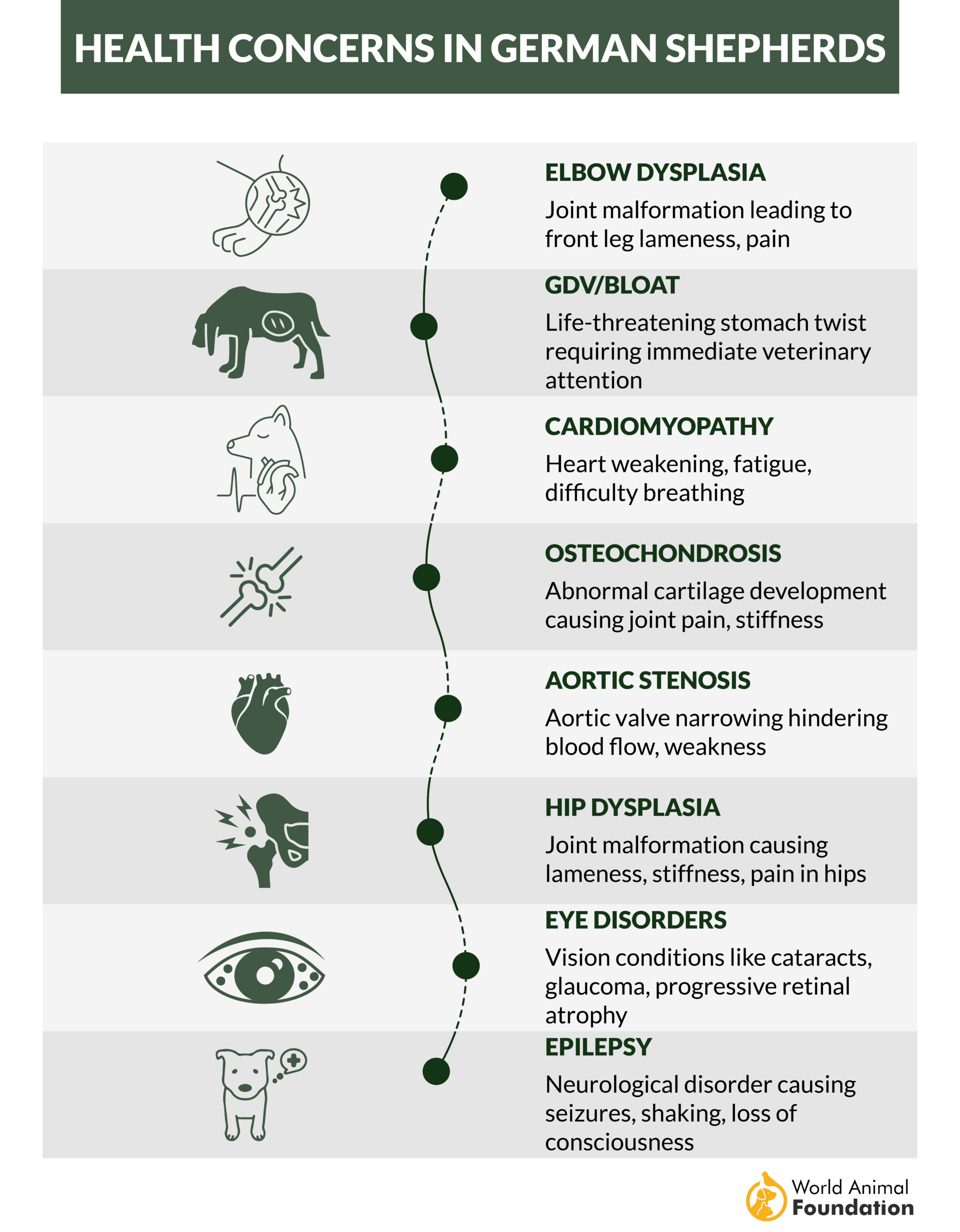The German Shepherd and Dutch Shepherd are two intelligent and highly capable herding breeds, often admired for their strength, loyalty, and versatility. While they share many similarities, such as their working instincts and protective nature, their distinct differences set them apart.
The German Shepherd is widely known for its role in police and military work, while the Dutch Shepherd, though lesser-known, is equally skilled in obedience and agility. Their coat patterns, size, and temperament differences can influence which breed is better suited to your lifestyle.
Whether you’re looking for a family companion, a working dog, or a guard dog, understanding these differences is essential. In this guide, we’ll compare the German Shepherd and Dutch Shepherd in terms of appearance, temperament, training needs, and overall care to help you make the right choice.
German Shepherd vs. Dutch Shepherd
The German Shepherd is a highly intelligent, loyal, and versatile breed known for its exceptional working abilities. With a strong, muscular build and a thick double coat, they excel in various roles such as police work, search and rescue, and service dog duties.

Petplan states that German Shepherds are highly trainable but require consistent guidance and mental stimulation to prevent behavioral issues. Their protective nature makes them an excellent family dog, especially when properly socialized from an early age.

A reputable breeder ensures that a good GSD comes from strong lines promoting health and temperament. Their prey drive and strong desire to work make them well-suited for scent work, dog sports, and other high-energy activities.
Though less common, the Dutch Shepherd is equally intelligent and hardworking, originally bred for herding animals. They have a more uniform brindle coat, making them easily distinguishable from the German Shepherd.

Known for their agility and endurance, Dutch Shepherds excel in obedience training and are often used in KNPV dogs, military, and protection work. They are independent yet eager to please, making them great companions for potential owners who understand their high drive and training needs.
With a primary focus on discipline and activity, Dutch Shepherds thrive in households where they receive structured training and plenty of exercise.
They make excellent friends for kids, provided they are trained well. Despite their protective instincts, they can be such a sweetie, proving that these dogs are as gentle as they are strong with the right upbringing.
German Shepherd vs. Dutch Shepherd: Size
The German Shepherd is a larger and more robust breed, typically standing between 22 to 26 inches tall at the shoulder and weighing 50 to 90 pounds. Males are generally bigger than females, with a solid, muscular build suited for demanding tasks like police work and guarding. Their size gives them a strong and imposing presence.

The Dutch Shepherd is slightly smaller and leaner, with a height range of 21 to 25 inches and a weight of 42 to 75 pounds. They have a more compact frame, allowing for greater agility and endurance, making them excellent for high-energy activities like herding and protection work. While they are not as heavyset as German Shepherds, their athletic build and brindle coat give them a sleek yet powerful appearance.
German Shepherd vs. Dutch Shepherd: Coat Type
The German Shepherd has a dense double coat in two main varieties: short-haired and long-haired. The outer coat is thick and coarse, protecting from harsh weather conditions, while the undercoat offers insulation.
Their coat requires regular brushing to keep it manageable, especially during seasonal shedding. German Shepherds typically come in black and tan, sable, or solid black color variations.
The Dutch Shepherd has a short, long, or rough coat, with the short-haired variety being the most common. Their coat is naturally weather-resistant and requires minimal grooming compared to the German Shepherd.

The most distinctive feature of Dutch Shepherds is their brindle pattern, which consists of dark stripes over a gold or silver base. This unique coat helps them blend into their surroundings, making them well-suited for working in various environments.
German Shepherd vs. Dutch Shepherd: Popularity
The German Shepherd is one of the most popular dog breeds worldwide, ranking consistently among the top breeds in the United States. Their intelligence, loyalty, and versatility make them a favorite choice for families, law enforcement, and service work.
Their widespread recognition in movies, TV shows, and military roles has further contributed to their popularity, making them a well-known and sought-after breed.

The Dutch Shepherd, however, is far less common and considered a rare breed outside of the Netherlands. While they are highly valued in police and military work, they are not as widely recognized by the general public.
Their brindle coat and strong work ethic make them a unique choice for experienced dog owners, but their rarity means they are not as frequently found in households as German Shepherds. However, their popularity has been steadily growing among working dog enthusiasts.
German Shepherd vs. Dutch Shepherd :Health Concerns
The German Shepherd (GSD) is prone to several genetic health issues, primarily due to extensive breeding over the years. One of the most common concerns is hip and elbow dysplasia, which can lead to joint pain and mobility issues, especially in adult dogs and older GSDs.

PetMD states that they are also susceptible to degenerative myelopathy, a progressive spinal disease, as well as bloating (gastric dilatation-volvulus), which can be life-threatening.
Good breeders prioritize health testing in their litters to minimize these risks. Regular vet checkups, proper diet, and training sessions help maintain their overall well-being.
The Dutch Shepherd tends to be a healthier breed with fewer genetic health problems, thanks to careful and selective breeding. However, they can still be prone to hip dysplasia at a lower rate than the German Shepherd.
AKC notes other potential concerns in Dutch Shep include allergies, eye issues, and thyroid problems, which can affect their teeth, coat condition, and energy levels.
German Shepherd vs. Dutch Shepherd: Lifespan
The German Shepherd has an average lifespan of 9 to 13 years, varying depending on genetics, diet, and overall care. As a typically larger breed, they are prone to certain age-related health issues like hip dysplasia and degenerative myelopathy, which can impact their longevity.
A good GSD from a responsible breeding program, combined with regular vet checkups, proper nutrition, and an active lifestyle, can live a longer, healthier life.
The Dutch Shepherd generally has a longer lifespan, averaging 11 to 15 years, making them an easier dog to manage in terms of longevity. Their naturally athletic build and fewer genetic health concerns contribute to their extended life expectancy.

Conclusion
Choosing between a German Shepherd and a Dutch Shepherd depends on lifestyle, preferences, and specific needs. While these two breeds share intelligence, loyalty, and protective instincts, their differences in coat colors, various lines, and temperament make each unique.
Whether you’re considering a GSD mix or a purebred, both beautiful dogs thrive with proper training, socialization, and a loving house environment.
If you’re looking for a pup that excels in protection, sports, or companionship, both breeds fit the bill. Some may prefer the Dutch Shepherd’s versatility, especially in KNPV lines, while others love the German Shepherd’s long-standing reputation in Germany and beyond.
Ultimately, both breeds are incredibly loyal, protective, and excellent choices for active owners. If you want a high-energy companion to guard, play, and be around children, a well-trained puppy from either breed will be fine.
So whether you’re drawn to a Dutch Shepherd’s unique personality or a German Shepherd’s classic appeal, you’ll end up with an amazing pup that stands out among other breeds—a true best friend for life!


